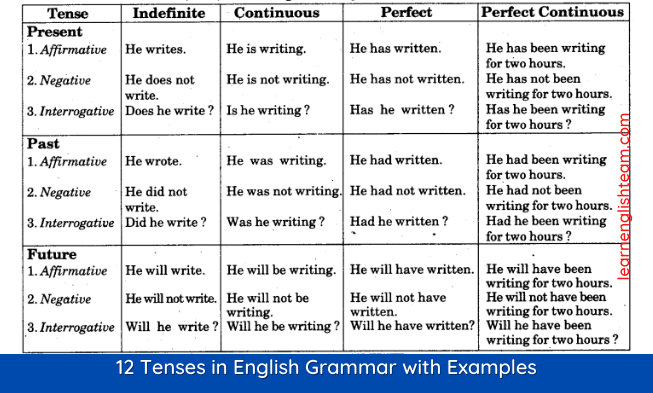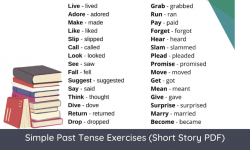12 Tenses in English Grammar with Examples (PDF)
Mastering the 12 tenses in English grammar is essential for a proper English and writing. In this guide, we break down each tense with easy-to-understand example sentences, ensuring you grasp the nuances of English grammar quickly. Plus, don’t miss out on our free downloadable PDFs that provide quick-reference guides for each tense, making your learning journey even easier!
English has 12 basic tenses which are divided into three main categories: past, present and future. All tenses have different forms for affirmative, negative and interrogative statements.
12 English Tenses PDF
→ 12 English Tenses PDF – download ←
→ 12 English Tenses Formula Examples PDF – download ←
Check Also: 12 English Tenses Exercise Notes and eBooks & (PDF Archive)
The 12 English Tenses: Formulas, Rules, and Examples
Learn about the 12 English tenses with usage explanations, formulas, auxiliary verbs and examples to improve your grammar skills.
1. Simple Present Tense
Formula:
- Affirmative: Subject + Base Verb (V1) + Object
- Negative: Subject + Do/Does + Not + Base Verb (V1) + Object
- Interrogative: Do/Does + Subject + Base Verb (V1) + Object?
Usage: Describes habits, general truths, and everyday activities.
Examples:
- Affirmative: I play soccer every Saturday.
- Negative: I do not play soccer on any day other than Saturday.
- Interrogative: Do I play soccer every day of the week?
2. Present Continuous Tense
Formula:
- Affirmative: Subject + Am/Is/Are + Verb (-ing) + Object
- Negative: Subject + Am/Is/Are + Not + Verb (-ing) + Object
- Interrogative: Am/Is/Are + Subject + Verb (-ing) + Object?
Usage: Describes ongoing actions happening at the present moment.
Examples:
- Affirmative: I am playing soccer right now.
- Negative: I am not playing soccer right now.
- Interrogative: Am I playing soccer right now?
3. Simple Past Tense
Formula:
- Affirmative: Subject + Verb (Past Form – V2) + Object
- Negative: Subject + Did + Not + Base Verb (V1) + Object
- Interrogative: Did + Subject + Base Verb (V1) + Object?
Usage: Describes actions completed in the past.
Examples:
- Affirmative: I played soccer yesterday.
- Negative: I did not play soccer yesterday.
- Interrogative: Did I play soccer yesterday?
4. Past Continuous Tense
Formula:
- Affirmative: Subject + Was/Were + Verb (-ing) + Object
- Negative: Subject + Was/Were + Not + Verb (-ing) + Object
- Interrogative: Was/Were + Subject + Verb (-ing) + Object?
Usage: Describes ongoing actions in the past.
Examples:
- Affirmative: I was playing soccer when she called.
- Negative: I was not playing soccer when she called.
- Interrogative: Was I playing soccer when she called?
5. Simple Future Tense
Formula:
- Affirmative: Subject + Will/Shall + Base Verb (V1) + Object
- Negative: Subject + Will/Shall + Not + Base Verb (V1) + Object
- Interrogative: Will/Shall + Subject + Base Verb (V1) + Object?
Usage: Describes actions or events in the future.
Examples:
- Affirmative: I will play soccer tomorrow.
- Negative: I will not play soccer tomorrow.
- Interrogative: Will I play soccer tomorrow?
6. Future Continuous Tense
Formula:
- Affirmative: Subject + Will Be + Verb (-ing) + Object
- Negative: Subject + Will Not Be + Verb (-ing) + Object
- Interrogative: Will + Subject + Be + Verb (-ing) + Object?
Usage: Describes ongoing actions in the future.
Examples:
- Affirmative: I will be playing soccer at this time tomorrow.
- Negative: I will not be playing soccer at this time tomorrow.
- Interrogative: Will I be playing soccer at this time tomorrow?
7. Present Perfect Tense
Formula:
- Affirmative: Subject + Has/Have + Past Participle (V3) + Object
- Negative: Subject + Has/Have + Not + Past Participle (V3) + Object
- Interrogative: Has/Have + Subject + Past Participle (V3) + Object?
Usage: Describes actions that happened at an unspecified time before now.
Examples:
- Affirmative: I have played soccer.
- Negative: I have not played soccer.
- Interrogative: Have I played soccer?
8. Present Perfect Continuous Tense
Formula:
- Affirmative: Subject + Has/Have Been + Verb (-ing) + Object
- Negative: Subject + Has/Have + Not Been + Verb (-ing) + Object
- Interrogative: Has/Have + Subject + Been + Verb (-ing) + Object?
Usage: Describes ongoing actions that started in the past and continue in the present.
Examples:
- Affirmative: I have been playing soccer for an hour.
- Negative: I have not been playing soccer for an hour.
- Interrogative: Have I been playing soccer for an hour?
9. Past Perfect Tense
Formula:
- Affirmative: Subject + Had + Past Participle (V3) + Object
- Negative: Subject + Had + Not + Past Participle (V3) + Object
- Interrogative: Had + Subject + Past Participle (V3) + Object?
Usage: Describes actions completed before another action in the past.
Examples:
- Affirmative: I had played soccer before I went to the party.
- Negative: I had not played soccer before I went to the party.
- Interrogative: Had I played soccer before I went to the party?
10. Past Perfect Continuous Tense
Formula:
- Affirmative: Subject + Had Been + Verb (-ing) + Object
- Negative: Subject + Had + Not Been + Verb (-ing) + Object
- Interrogative: Had + Subject + Been + Verb (-ing) + Object?
Usage: Describes ongoing actions that continued up to a point in the past.
Examples:
- Affirmative: I had been playing soccer for two hours before the game ended.
- Negative: I had not been playing soccer for two hours before the game ended.
- Interrogative: Had I been playing soccer for two hours before the game ended?
11. Future Perfect Tense
Formula:
- Affirmative: Subject + Will Have + Past Participle (V3) + Object
- Negative: Subject + Will + Not Have + Past Participle (V3) + Object
- Interrogative: Will + Subject + Have + Past Participle (V3) + Object?
Usage: Describes future actions completed by a specific time.
Examples:
- Affirmative: By next year, I will have played soccer for ten years.
- Negative: By next year, I will not have played soccer for ten years.
- Interrogative: Will I have played soccer for ten years by next year?
12. Future Perfect Continuous Tense
Formula:
- Affirmative: Subject + Will Have Been + Verb (-ing) + Object
- Negative: Subject + Will + Not Have Been + Verb (-ing) + Object
- Interrogative: Will + Subject + Have Been + Verb (-ing) + Object?
Usage: Describes ongoing actions continuing up to a point in the future.
Examples:
- Affirmative: By the end of the day, I will have been playing soccer for six hours.
- Negative: By the end of the day, I will not have been playing soccer for six hours.
- Interrogative: Will I have been playing soccer for six hours by the end of the day?





its very useful to us.thank you.
You are welcome!
Very usefull sir thanking you